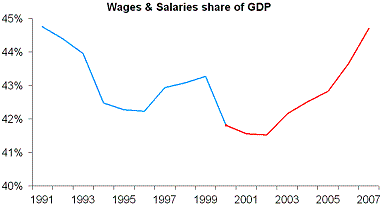A while ago, Truthseeker asked why trade emissions credits anyway?, and suggested if the government fails to gain a majority for the ETS, we may want to try alternative, regulatory policies:
Legislatively mandating emissions reductions to an open and transparent regulatory schedule and NOT operating a market may actually be cheaper and ultimately more effective than an ETS.
I've already talked about
why we have an ETS (short answer: a policy culture still suffering from a starry-eyed infatuation with markets), but I promised that I'd look at what a regulation-based climate change policy might look like. So, here we go.
The first thing to note is that in this area of policy, there is nothing new under the sun, and its all been thought of before. When climate change first appeared on the policy radar, twenty years ago (yes, its been that long), the government commissioned the New Zealand Climate Change Programme to look at possible policies. They reported back in 1990, with a menu of policy options that looks depressingly familiar to anyone considering climate change policy today. Energy efficiency, promoting forestry, negotiated greenhouse agreements, economic instruments, the RMA, even "extreme measures" such as shutting down Huntly or lowering the speed limit were considered. Our problem has never been coming up with solutions - they're obvious the moment you pause to think about them. It's been implementing them. And that makes regulation an attractive proposition, because its usually easier to do (and certainly easier to do piecemeal) than imposing a unified, top-down solution such as a carbon tax or ETS.
The second thing to note is that the current government has been far more willing than its predecessors to use regulation as a backstop to economic instruments. So we now have basic fuel efficiency standards for cars, basic energy efficiency standards, and a proposal to ban new thermal electricity generation. This is a good idea - because as I mentioned in my previous post, its not an either/or proposition. Good regulation can be an excellent supplement to economic instruments, and help drive improvements if the market won't.
So what regulatory solutions should the government impose to reduce emissions if the ETS fails? Here's my take, by sector:
Energy: The problem here is thermal generation, so the obvious step is to ban the construction of new thermal plants and force all new generation to be renewable (note that the government is trying to do this in the ETS bill - something they perhaps should have separated out so as to get it through piecemeal). Require some proportion of emissions from existing thermal stations to be offset by planting trees (I prefer native forest, but exactly what doesn't matter). But that's only half the problem - we need to reduce existing emissions as well. Here the answer is extremely aggressive energy efficiency regulation, on a par with California's (California has managed to keep its per capita electricity usage basically flat for the past twenty years, while the rest of America has grown by 50%). So, energy efficiency standards for all appliances, a much tighter building code, requirements to upgrade housing (and financial help to make it happen). It's all worth doing because the marginal generator in our electricity system is coal, thus every kWh we save directly reduces emissions.
Industrial: Put climate change back in the RMA, and require new factories to meet stringent energy efficiency standards (ironically, in the case of big polluters like HolCim and Tiwai Point, they do). Require some proportion of emissions from factories to be offset by planting trees. Exactly what proportion will depend on how deep a cut we want to make; 20% seems reasonable at first.
Transport: There are three ways to reduce transport emissions: reducing usage, substituting fuels, and improving efficiency. So, fund public transport properly to get people out of cars. Ban heavy trucks, and encourage the use of rail. Impose a mandatory sustainable biofuels requirement on oil companies to spur local production from sustainable sources. And finally, impose stringent fuel efficiency standards (again, look at California) on new cars, and improve the fuel efficiency of the overall vehicle fleet by refusing to warrant cars over a certain age which fail to meet rising minimum standards. The latter should cap emissions, while the former two policies gradually reduce them.
Agriculture: Require resource consent for farming (it is after all a polluting activity). Impose intensity restrictions, limiting the number of cattle you can have per hectare (this affects nitrous oxide emissions). Require the use of nitrogen inhibitors in fertiliser.
Forestry: Ban deforestation - no cutting down forests unless they are replanted (this is pretty much what the ETS does in practice).
Waste: This is already controlled by a regulatory means: the Resource Management (National Environmental Standards Relating to Certain Air Pollutants, Dioxins, and Other Toxics) Regulations 2004 require large landfills containing putrescable material to capture or flare the resulting methane. And it works well.
Solvents: Not important enough to worry about.
Some of these measures are almost certainly more effective than economic measures; if you want to ban deforestation, then the easiest way is to ban deforestation, not muck about with tradable certificates. Where they fall down is that they lack flexibility - its rare to want a total ban on something, and the hassle factor of thinking up all the exceptions can be significant. Still, in cases where we want close to a total ban (e.g. thermal electricity generation and deforestation) its hard to see what we gain by using a market. More importantly, if the ETS fails, I don't think we can wait to be fifth-time lucky with a market solution. What's important is that we reduce emissions now, not whether our chosen policy is perfect and cleaves to neo-liberal orthodoxy.








